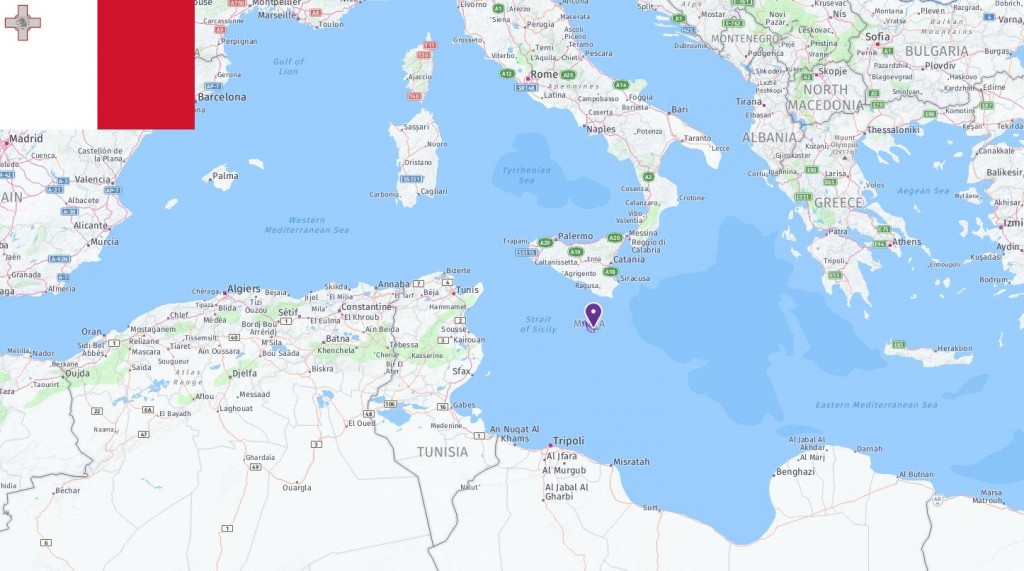MT is the abbreviation for Malta, the 185th largest country in the world. Officially the Republic of Malta, Malta is a country located in Europe. Valletta is the capital city of Malta. Major cities include Birkirkara (population: 21,665), Qormi (population: 18,219), Mosta (population: 17,778), Żabbar (population: 15,019), San Pawl il-Baħar (population: 14,046), Saint John (population: 12,335), Fgura (population: 11,665), Żejtun (population: 11,538), Sliema (population: 11,307), and Haz-Zebbug (population: 11,052).
Country Profile
- Capital: Valletta
- Language: Maltese
- Area: 316 km2
- Population: 493,548
- Currency: Euro (€) (EUR)
- Time zone: UTC+1
- Calling code: 356
- ISO 2-Letter Abbreviation: MT
- UN 3-Letter Abbreviation: MLT
- Internet TLD: .mt
- State Government Website: http://gov.mt
List of Malta Acronyms
The most commonly used abbreviations about Malta are MT which stands for Malta and EUR which means Euro (Malta currency). In the following table, you can see all acronyms related to Malta, including abbreviations for airport, city, school, port, government, and etc.

Geography
The archipelago consists of the islands of Malta, Gozo, Camino and several uninhabited rocks. They are located on a shelf that makes up the remains of the land bridge that once linked Sicily and Africa. The country has no permanent lakes or rivers. The landscape is characterized by low hills with bush growth and there are no forest areas. The country has a distinctly Mediterranean climate with warm dry summers and mild winters. Minus degrees have never been measured in the country.
Access to clean fresh water is a major challenge in Malta. The country’s population and agriculture depend entirely on desalinated seawater to obtain fresh water. This makes the country vulnerable if something were to happen to the factories where this process takes place.
History
Malta has been inhabited since 5000 BCE. Due to its strategic position between North Africa, the Middle East and Southern Europe, the archipelago has been occupied and colonized by a number of large civilizations and kingdoms. Among other things, the island kingdom has been linked to the megalithic culture, Carthage, the Roman Empire, the vandals, the Eastern Goths, the Byzantines, the Arabs and the Normans. In 1530, the Johanan Knights came to the islands, establishing large defenses, churches and palaces around the main city, Valletta. The Order of Knights was eventually recognized as the Maltese Order, and ruled the island kingdom until 1798 when Napoleon conquered the islands. The Maltese were assisted by the British colonial force to fight Napoleon’s army, and gained the status of a British colony until 1964. During World War II, Malta was heavily bombed because of its strategic location.
After the independence of Britain in 1964, the policy was based on cooperation with the Soviet Union and their allies in Eastern Europe. Towards the end of the 1980s, politics and the economy were liberalized, and the country became stronger with the United States and Western Europe. Malta entered into a ‘Partnership for Peace Agreement’ with NATO in 1995, and joined the EU in 2004. The country remains linked to Britain through the British Commonwealth of nations made up of former British colonies.
Society and politics
Malta is a parliamentary democracy within the British Commonwealth. The constitution of independence in 1964 was amended ten years later and the country became a republic. In the past, the British queen was head of state. The country’s head of state is today the president, who is appointed by parliament. The president has primarily formal duties, and executive power is added to the government.
The country has long adhered to the principle of neutrality in its foreign policy, even after joining the EU in 2004. The location between North Africa and Europe makes the country a natural gateway to the EU, and the country has problems with illegal immigration. Malta receives regular EU funding to deal with illegal immigration from North Africa.
The island state has a well-developed health system and the standard of living is high. Conservative Catholic religion plays an important role in Maltese politics and society. Abortion is illegal and can be punished with imprisonment for both the woman and the perpetrator. Divorce became legal only after a law change in 2011. Despite the Catholic Church’s influence, LHBTI + persons have since 2017 been entitled to marry.
Economics and Commerce
Malta’s economy is entirely dependent on foreign trade. The country has limited natural resources and agriculture is negligible. The most important export goods are clothing and shoes, but compared to all the goods the country must import, there is a large trade deficit (they import more than they export). Malta’s most important industry is tourism, which accounts for around one-third of the country’s gross domestic product. Finance and insurance are other important industries for the country.
Malta joined the euro in early 2008. As the economy is largely dependent on external trade, the global financial crisis in 2008 had a major impact on the country. Since the downturns at the end of the 2010s, the economy has risen in recent years. Among other things, unemployment has fallen significantly and the country’s foreign debt has decreased.
View this article in other languages:
Deutsch – Français – 繁體中文


